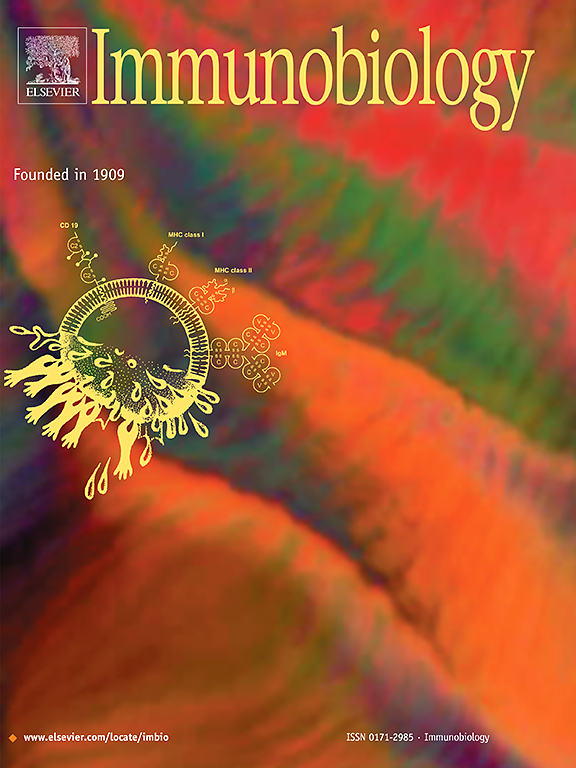Nucleotide receptor P2X7/STAT6 pathway regulates macrophage M2 polarization and its application in CAR-T immunotherapy
IF 2.3
4区 医学
Q3 IMMUNOLOGY
引用次数: 0
Abstract
Background
A key factor underlying the failure of Chimeric Antigen Receptor-T Cell (CAR-T) therapy in ovarian cancer (OC) is the presence of an immunosuppressive tumor microenvironment, which is intricately linked to M2 polarization among tumor-infiltrating macrophages. P2X7 receptor has been previously documented as expressed within these macrophages and its correlation with M2 polarization is evident. This investigation scrutinizes whether silencing of P2X7 receptor within macrophages could lead to augmented anti-tumor potency of CAR-T.
Method
Human peripheral blood mononuclear cells were artificially differentiated into macrophages or M2 macrophage in vitro. After silencing P2X7 receptor and/or overexpressing STAT6 within macrophages, the M1 and M2 markers were evaluated via flow cytometry, ELISA, and qRT-PCR. Additionally, the phosphorylation level of STAT6 was monitored by western blot. We engineered CAR-T cells targeting the non-functional P2X7 (nfP2X7) receptor, and co-cultured them with macrophages silencing P2X7 receptor along with OC cells. The anti-tumor effect of these CAR-T cells was assessed through evaluating OC cell viability, lactate dehydrogenase release, and IFN-γ levels.
Result
P2X7 receptor silencing promotes M1 macrophage marker expression (CD86, TNF-α, IL-6, IL-1β), diminishes M2 macrophage marker expression (CD206 and IL-10) and suppresses STAT6 phosphorylation, whereas STAT6 overexpression reverses these phenomena. Furthermore, M2 macrophage suppresses the toxic effect of CAR-T cells on OC cells, while silencing the P2X7 receptor nullifies the immunosuppressive effect of M2 macrophages on CAR-T cells.
Conclusion
Silencing P2X7 receptor can reverse M2 macrophage polarization by suppressing STAT6 activation, thereby enhancing the anti-tumor efficacy of CAR-T cells targeting nfP2X7 receptor in OC cell lines.
核苷酸受体P2X7/STAT6通路调控巨噬细胞M2极化及其在CAR-T免疫治疗中的应用
背景:嵌合抗原受体- t细胞(CAR-T)治疗卵巢癌(OC)失败的一个关键因素是免疫抑制肿瘤微环境的存在,这与肿瘤浸润巨噬细胞中的M2极化有着复杂的联系。P2X7受体在这些巨噬细胞中表达,其与M2极化的相关性是明显的。这项研究仔细研究了巨噬细胞内P2X7受体的沉默是否会导致CAR-T抗肿瘤效力的增强。方法:体外人工将人外周血单个核细胞分化为巨噬细胞或M2巨噬细胞。在巨噬细胞内沉默P2X7受体和/或过表达STAT6后,通过流式细胞术、ELISA和qRT-PCR评估M1和M2标记物。western blot检测STAT6的磷酸化水平。我们设计了靶向无功能P2X7 (nfP2X7)受体的CAR-T细胞,并与沉默P2X7受体的巨噬细胞以及OC细胞共培养。通过评估OC细胞活力、乳酸脱氢酶释放和IFN-γ水平来评估这些CAR-T细胞的抗肿瘤作用。结果:P2X7受体沉默可促进M1巨噬细胞标志物(CD86、TNF-α、IL-6、IL-1β)表达,降低M2巨噬细胞标志物(CD206、IL-10)表达,抑制STAT6磷酸化,而STAT6过表达可逆转上述现象。此外,M2巨噬细胞抑制CAR-T细胞对OC细胞的毒性作用,而沉默P2X7受体使M2巨噬细胞对CAR-T细胞的免疫抑制作用无效。结论:沉默P2X7受体可通过抑制STAT6激活逆转M2巨噬细胞极化,从而增强靶向nfP2X7受体的CAR-T细胞在OC细胞中的抗肿瘤作用。
本文章由计算机程序翻译,如有差异,请以英文原文为准。
求助全文
约1分钟内获得全文
求助全文
来源期刊

Immunobiology
医学-免疫学
CiteScore
5.00
自引率
3.60%
发文量
108
审稿时长
55 days
期刊介绍:
Immunobiology is a peer-reviewed journal that publishes highly innovative research approaches for a wide range of immunological subjects, including
• Innate Immunity,
• Adaptive Immunity,
• Complement Biology,
• Macrophage and Dendritic Cell Biology,
• Parasite Immunology,
• Tumour Immunology,
• Clinical Immunology,
• Immunogenetics,
• Immunotherapy and
• Immunopathology of infectious, allergic and autoimmune disease.
 求助内容:
求助内容: 应助结果提醒方式:
应助结果提醒方式:


